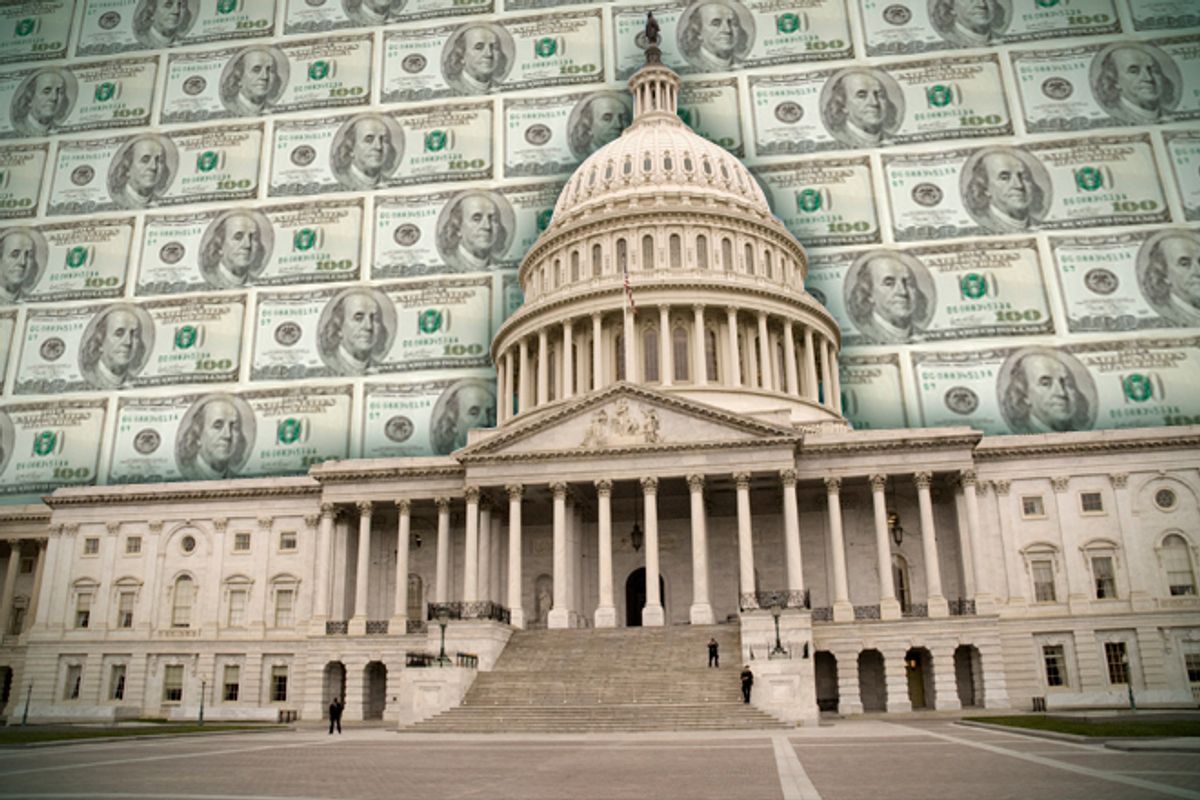Are you rich and want to get richer? Vote Republican! The stronger the GOP is in Congress, the larger the share of wealth the top 1 percent controls, according to a new study in the October issue of American Sociological Review, which confirms what we figured all along -- there's a direct connection between the rightward shift of Congress and the upward advance of the richest Americans’ net worths.
From 1949 through 2008, the impact of a 1 percentage point increase in the share of seats held by Republicans in the House (a little over five seats) raised the top 1 percent’s income share by about .08 percentage points. “At first glance, this might seem negligible," said Thomas Volscho, a sociologist at CUNY-College of Staten Island who co-authored the study. But it's not. "Given that the estimated national income in 2008 was more than $7.8 trillion, an increase of only 1 percent in Republican seat share would raise the income of the top 1 percent by nearly $6.6 billion. That equates to about $6,600 per family in the top 1 percent."
The ASR study, “The Rise of the Super-Rich,” looks at the experience of the 1 percent from just after World War II to 2008 and identifies several other factors that have propelled the top tier's rise. The fact that the uber wealthy have gotten richer much faster than lower-income brackets has been well documented and helped spark the Occupy movement, but this research looks at the role that policy and other variables have played.
Beyond politics, Volscho and Kelly found that the decline of private-sector union membership, and the increasing financializing of the economy -- which has heightened the impact of financial-asset bubbles -- were also key contributors to income inequality and the rise of the 1 percent. Over the 60 years the paper studied, a 1 percentage point decrease in union membership among private sector workers was linked to a more than 0.4 percentage point increase in the income share of the super-rich.
But the most surprising finding of the study may be the impact a GOP Congress has on income inequality. “Based on our analysis, Democrats appear to favor an economic system that produces more egalitarian outcomes even before any redistribution occurs," the study concludes. "In essence, the market is not completely beyond the influence of politics and policy, and it is not just in the realm of explicit redistribution that political parties produce divergent distributional outcomes. Political decisions in part ‘make the market."
Interestingly, the party affiliation of the president did not significantly impact the wealth share of the top 1 percent. Volscho told Salon he was surprised by that finding. Instead, it’s Congress that has the bigger impact. “It was surprising, but not. Because if you look at, in 1995, the Republican takeover over Congress, that’s when you started to see the spike in the top 1 percent,” he said. “They had been doing well since around 1980, but not as well as around 1995. And the stock market boom started in 1995 as well, but we took that into consideration and that had an independent effect.”
The study doesn’t get into specific policies that impact income inequality much, calling for further research on the subject, but it doesn’t take a Ph.D. to make some pretty good guesses. Republicans (with help from Democrats, no doubt) have pushed tax cuts that disproportionately impact the wealthy, opposed redistributive programs, decreased financial regulation, which allowed for the explosion of financial speculation, cut education funding, etc. “There are so many things, appointments, heads of agencies, mundane policies and regulations that filter down from Congress into government agencies that potentially can aid the very rich,” Volscho said.
But a Republican president like Mitt Romney could help in that they would “make that pro-1 percent legislation flow through so much quicker,” Volscho said. Of course, this isn’t too surprising -- polls consistently show that Americans think Romney and the GOP would do more to help the wealthy. Now social science shows they’re right!



Shares